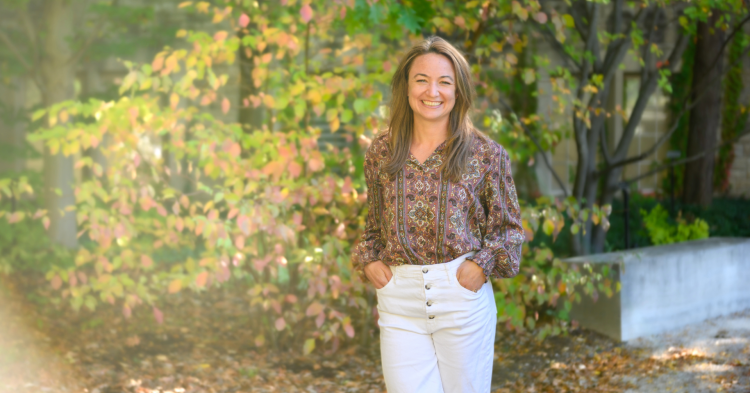The six-year-old boy had already been expelled from several schools by the time he landed in Breanne Kearney's care. Angry, unpredictable and labelled with everything from ADHD to behavioural issues, he arrived withdrawn and wary of adults.

Breanne Kearney is graduating with her PhD in neuroscience, earning the Governor General's Gold Medal for outstanding scholastic achievement. (Megan Morris/Schulich Medicine & Dentistry)
Kearney saw beyond that. In a clinic space filled with swings and foam mats, she worked with him through movement and play to build emotional regulation skills.
Six months later, that same boy was graduating from his first-grade class.
For Kearney, the experience redrew the map of her career, leading her from clinical practice as an occupational therapist to the world of academic research.
"It shifted things entirely for me," she said. "It got me thinking about the connection between sensory processing and trauma, and how we can use this in therapy to intervene more effectively."
This month, Kearney officially graduates from Schulich Medicine & Dentistry with her PhD in neuroscience, earning the Governor General's Gold Medal for outstanding scholastic achievement.
Working with Dr. Ruth Lanius, Kearney's research examines how trauma impacts the brain's sensory-motor networks. Using functional MRI, she studies adults living with post-traumatic stress disorder.
"Many people with trauma feel it in their bodies - tension, pain or visceral unease. We wanted to know what parts of the brain correspond with this sense of reliving things somatically in the body." - Breanne Kearney, PhD'25 (Neuroscience)
Part of her research explored an emerging psychotherapy called deep brain reorienting, which targets the earliest, reflexive responses to traumatic events.
"This therapy focuses on the shock response from the lowest part of the brain, before any thoughts or feelings," explained Kearney. "It backs things up to a very early sensory motor response."
In a clinical trial, Kearney and her colleagues found the therapy produced significant improvements in participants' symptoms, particularly among those who hadn't responded to traditional therapies.
"It offers another option for people, especially those who don't do well with exposure or talk therapy," she said.
Raised in Long Island, NY, Kearney trained as an occupational therapist at the University of New Hampshire. She discovered neuroscience almost by accident - her interest was sparked during a neurology course her classmates all dreaded - and later spent six years in Portland working with children and adolescents with neuro-developmental challenges.
A master's degree in cognitive neuroscience at University College London followed - then an email to Lanius that set her current work in motion.
"I still can't believe I cold emailed Dr. Lanius, having no clue how much of a giant she is in this field," she said with a laugh. "But I remember writing to her that I believed in this work more than anything."
From one London to the other, Kearney found her footing - first in a new city, then in a field that merged her clinical interests with scientific discovery.
"The more I'm involved in research and the more I learn about the brain, I realize how little we actually know," she said. "That's what is so cool about science. It forces you to be comfortable with the unknown."
With her doctorate complete, Kearney is now continuing her research at Schulich Medicine & Dentistry as a postdoctoral scholar and pursuing the final stages of licensure in Canada. She plans to divide her time between research and occupational therapy.
"I'm passionate about having a foot in research while still keeping myself in the reality of seeing people in the clinic. It just gives me such a richer understanding," she said. "And working with people, especially children - that's my heart's work."










